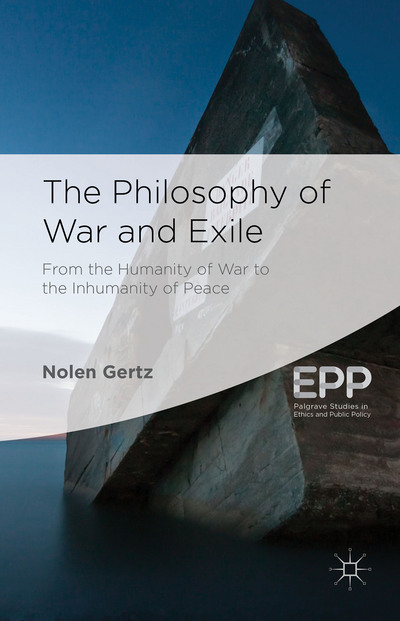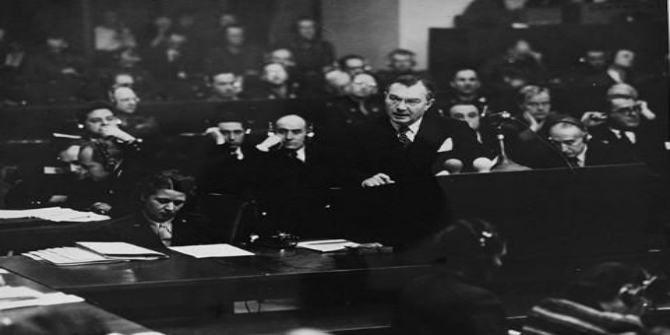Through a close critique of PTSD theory, just war theory, and Western ethics, combined with an empirical study of contemporary military training and torture methods, The Philosophy of War and Exile by Nolen Gertz is a compelling resource, writes Esther Adaire. Gertz’s intricate critique of the moral conundrums involved in war and peace makes evaluations that will resonate with those who are familiar with a range of theoretical perspectives.

Post-traumatic stress disorder (PTSD) is an ambiguous term, historically a catchall for numerous psychological affects produced by war. In The Philosophy of War and Exile, Nolen Gertz plots the gaps in our conventional understanding of trauma, starting with an analysis of common morality and its incapacity to accommodate an understanding of the war veteran’s experience, tracing the error from its emergence at the beginning of the 20th century right up to its impact on current events. Significantly, Gertz also asks pressing questions about the ethical implications of ‘unmanned warfare’ – the employment of drone operators and cyber warriors in recent conflict. Through a close critique of PTSD theory, just war theory, and Western ethics, combined with an empirical study of contemporary military training and torture methods, the book is a compelling resource for anyone with either a historical or present-day interest in war studies, or political philosophy and ethics.
In the first half of the book Gertz devotes his analysis to that of morality and responsibility, beginning with a critique of the assumptions made by just war theorists such as Michael Walzer and Jeff McMahan. In chapter one, “The Lust for War vs. The Lust for Judgment”, the discussion focuses on the presuppositions that are made by just war theorists when they assert that ‘there is one morality we all already live by’ (p. 16), as opposed to the philosophical search for a notion of what morality should look like, but doesn’t. Crucially for Gertz, this assumed morality implies an ‘us vs. them’ mentality, not merely in terms of the two sides fighting in any given war, but in the way society relates to the combatant who has returned home. The dissonance that is generated by the veteran’s inability to rehabilitate to what we think of as normal, peaceful, civilian life stems from an underlying misconception about what this life depends upon in order to thrive. Built into common morality is a supposition, stemming back at least as far as Saint Augustine, about what constitutes ‘legitimate authority’, and ‘right intention’ (p. 19).
Having deconstructed this universal ethical framework, Gertz goes on to examine the inability of non-combatants to empathise with veterans who have experienced the unsettling revelations of war. In the second chapter, “A World Without Responsibility”, he takes a close look at where non-combatants tend to place responsibility for the wrongdoings that occur in war, in comparison to the perspective of those who have fought. Much of the analysis emerges from the concept of difference – between retrospective experience and experience during combat, between legality and morality, and between the moral inequalities concerning combatants, versus that of average citizens. Key to the understanding of these paradigms is the evolution of psychological warfare, as the soldier grows more and more distant in physical proximity from his target. Through a diachronic tracing of the behaviour of the combatant, from those who held their fire in the earlier wars of the 20th century, to the staggering amount of soldiers who did fire during Vietnam, Gertz analyses the changing identity of the soldier both from their own perspective and society’s, and, ‘by reframing war around identity and meaning’ (p. 36), illuminates the paradoxes in the way that we understand responsibility.
 Image credit: Photograph from the Army Signal Corps Collection in the U.S. National Archives (Wikimedia, Public Domain)
Image credit: Photograph from the Army Signal Corps Collection in the U.S. National Archives (Wikimedia, Public Domain)
The concept of responsibility becomes significantly more complex in the second half of the book, “Being in Exile, Being as Exile”,wherein Gertz focuses on an empirical study of the task of the drone operator – which, it becomes clear, has been vastly underestimated in public perception. Addressing the widespread concern that operating a drone is not dissimilar to playing a video game (with particular reference to Nasser Hussain’s article The Sound of Terror: Phenomenology of a Drone Strike), Gertz begins by challenging assumptions about what affect the distance of the drone operator from their target has on their ‘heart’ (p. 97) – put plainly, whether this distance makes it easier for them to kill. Citing ‘the dazzling clarity of the drone’s optics’ (p. 100), and the lived experience of the drone operator as they track their target for days before striking, getting to know the target intimately, Gertz paints a picture of drone warfare that we can begin to understand as being just as difficult and traumatic as ‘traditional’ combat. He further discerns that it is the ‘tension’ between absence and presence, distance and intimacy (p. 97) that makes this experience so unsettling; a dynamic which in fact leaves ‘no room for escapism’ (p. 110). Drawing upon Cartesian notions of mind/body dualism in order to illustrate how public perception imagines drone warfare to work, Gertz posits that the embodiment of the pilot with/as their drone – despite operating it from a distance – must be imagined if we are to understand ‘what drone warfare is rather than what drone warfare only appears to be’ (p. 103).
These differences and tensions – within both the experience of the combatant or drone pilot, and also within our perception of that experience – culminate for Gertz with his theory of ‘exile’ as the position of the war veteran within society. Citing the alienation and harassment of veterans who returned home from the war in Vietnam, and the mockery of drone operators who try to express their trauma, Gertz perceives that both traditional combatants and modern drone operators have been exiled from a society that severely misunderstands these experiences of war and which refuses to take due responsibility. Crucially, Gertz discerns that traumatic events are not recognised as having been made possible by a ‘peaceful’ society, and so they are placed in another, aberrant realm, thereby protecting the status quo: ‘The diagnosis of PTSD serves to treat what can be seen as our fears of having to face the truth of our everyday lives, rather than serving to treat what is seen as their fears of having to relive such “traumatic” events.’ (p. 121). This is not to ask ‘whether PTSD exists’ (p. 122), but rather, whether we should not instead be re-evaluating the ‘normality’ – the morality – that treatment of these symptoms seeks to return the veteran to.
Gertz’s intricate critique of the moral conundrums involved in war and peace makes evaluations that will resonate with those who are familiar with a range of theoretical perspectives, from classical philosophy, to political theory, to studies of affect phenomenology. He effectively and persuasively highlights the need for further discussion on how better to understand the lived experience of the war veteran, and for a reconsideration of the ways in which common morality justifies acts of war.
This review originally appeared at the LSE Review of Books.
Please read our comments policy before commenting.
Note: This article gives the views of the authors, and not the position of USApp– American Politics and Policy, nor of the London School of Economics.
Shortened URL for this post: http://bit.ly/1AkCRId
——————————————–
Esther Adaire – Goldsmiths, University of London
Esther Adaire is currently studying for a Masters in History at Goldsmiths, University of London, in which she is focused on the Holocaust and German-Jewish intellectual history. Her current research involves sociological studies of anti-Semitism and totalitarianism, alongside theories of emotion and affective phenomenology in their capacity to explain the ‘mass psychology of fascism’. Peripheral research areas include continental philosophy (most notably Adorno, Benjamin, and Deleuze), Jewish thought and theology, religious conflict, and applied ethics. Her other main area of interest is Weimar culture and the artistic avant-garde, from dada to futurism. She can be followed on twitter @esthermaschine.




